This step by step diy project is about wood planter box plans. I have designed this patio planter box for you to build it in one weekend with basic tools. Invest in weather resistant materials. You only need basic tools and skills to build this love seat, but you will also save a significant amount of money. Take a look over the rest of my woodworking plans, if you want to get more building inspiration.
Planter boxes are awesome because they let you control the soil and drainage, which means healthier plants and less fuss. Plus, they’re perfect for small spaces like patios or decks, so you can have a lush garden no matter where you live.
When buying the lumber, you should select the planks with great care, making sure they are straight and without any visible flaws (cracks, knots, twists, decay). Investing in cedar or other weather resistant lumber is a good idea, as it will pay off on the long run. Use a spirit level to plumb and align the components, before inserting the galvanized screws, otherwise the project won’t have a symmetrical look. If you have all the materials and tools required for the project, you could get the job done in about a day. See all my Premium Plans HERE.
Projects made from these plans
Building a wood planter box
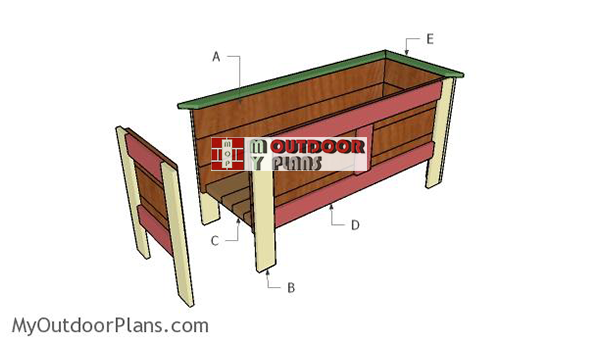
Building-a-wood-planter-box
Cut & Shopping Lists
- A – 6 pieces of 1×6 lumber – 48″ long, 6 pieces – 16″ long BOX
- B – 8 pieces of 1×4 lumber – 24″ long LEGS
- C – 3 pieces of 2×4 lumber – 46 1/2″ long, 1 piece of 2×6 lumber – 46 1/2″ long BOTTOM
- D – 4 pieces of 1×4 lumber – 41″ long, 4 pieces – 12″ long, 2 pieces – 9 1/2″ long TRIMS
- E – 2 pieces of 1×3 lumber – 51 1/2″ long, 2 pieces – 21″ long TOP TRIMS
- 4 pieces of 1×6 lumber – 8′
- 5 pieces of of 1×4 lumber – 8′
- 2 pieces of 1×3 lumber – 8′
- 1 piece of 2×6 lumber – 6′
- 1 piece of 2×4 lumber – 12′
- 100 pieces of 2 1/2″ pocket screws, 100 pieces of 1 1/4″ pocket screws
- 1 1/2″ brad nails
- wood filler, wood glue, stain/paint
Tools
![]() Hammer, Tape measure, Framing square, Level
Hammer, Tape measure, Framing square, Level
![]() Miter saw, Drill machinery, Screwdriver, Sander
Miter saw, Drill machinery, Screwdriver, Sander
Time
Related
Wood Planter Box Plans
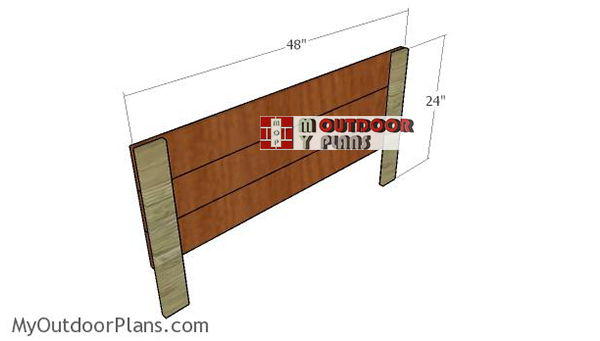
Building-the-sides-for-planter
The first step of the project is to build the sides for the planter box. Use 1×6 lumber for the planter box and 1×4 lumber for the legs. Lay the slats on a level surface making sure there are no gaps between the components. Make sure the edges are flush and attach the legs. Drill pilot holes and insert at least two screws into each slat. Add waterproof glue for a stronger bond of the components.
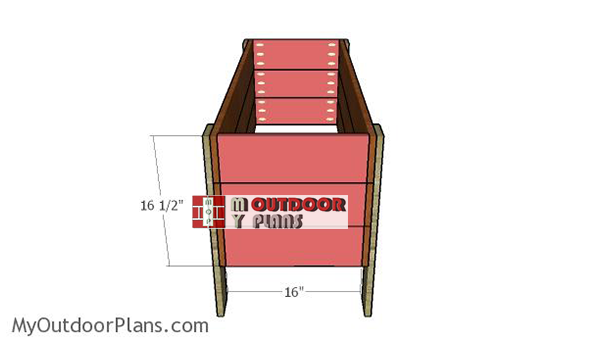
Assembling-the-planter-box
Next, you need to attach the 1×6 slats to the ends of the planter box. Drill pocket holes at both ends and insert 1 1/4″ screws to secure them together tightly. Add glue to the joints and make sure the corners are right angled.
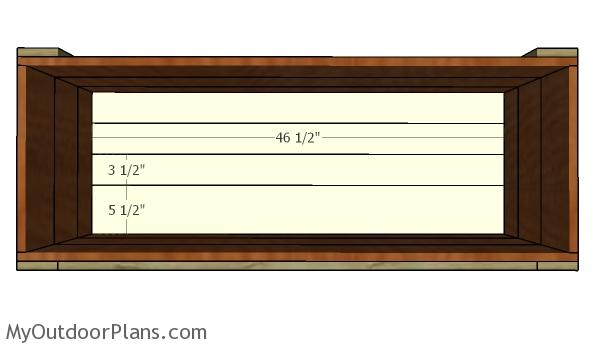
Attaching the bottom slats
Fit the 2×4 and 2×6 slats to the bottom of the planter box. Leave no gaps between the components. In addition, I recommend you to drill pocket holes along the common edges and to insert 2 1/2″ screws, so you create a rigid surface. Alternatively, you can use waterproof glue and clamp them together before fitting the bottom to the frame.
Drill pilot holes through the frame of the planter box and insert 2 1/2″ screws into the bottom. Insert the screws every 8″ for a professional result.
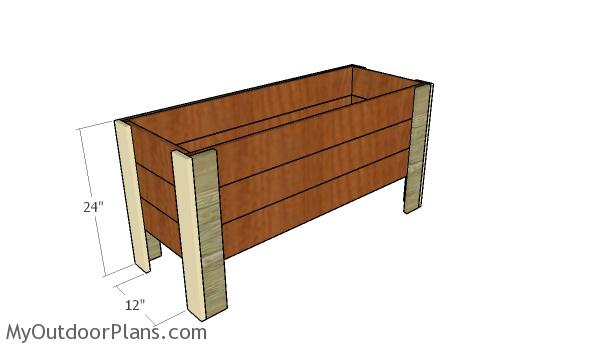
Fitting the end legs
Next, you need to attach the 1×4 legs to the ends of the planter. Align the edges flush and add glue to the joints. Next, insert 1 1/2″ brad nails to secure the legs into place tightly.
Fitting the trims
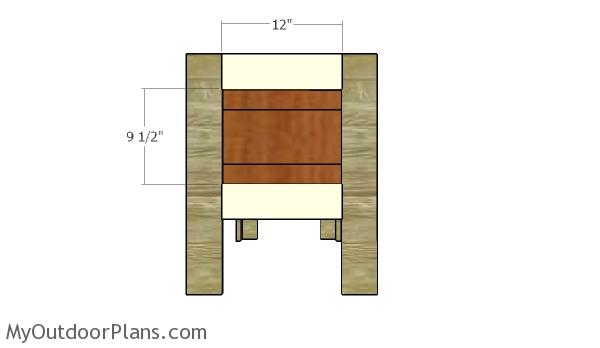
Fitting the end trims
Continue the project by fitting the decorative trims to the ends of the wood planter box. Use glue and 1 1/2″ brad nails to secure the trims into place. These trims will enhance the look of the project and make it stand out.
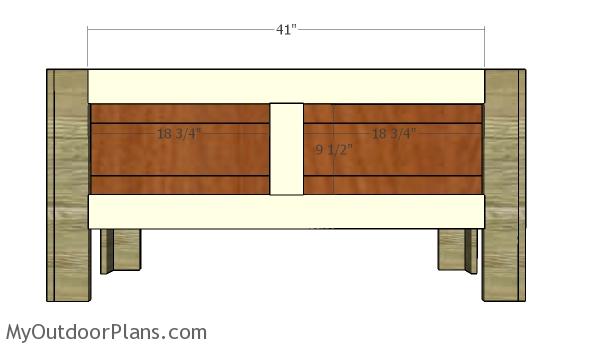
Fitting the side trims
Fit the 1×4 decorative trims to the front and back of the planter, as well. Use waterproof glue and 1 1/2″ brad nails to secure the trims to the planter box.
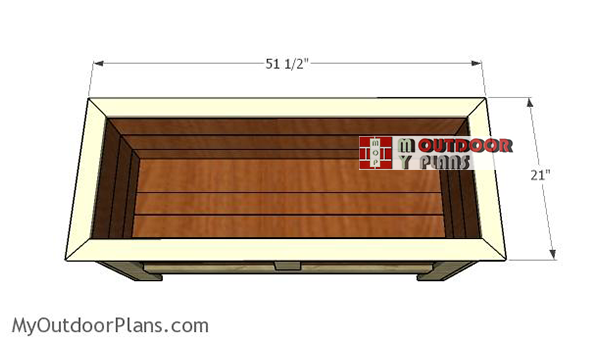
Fitting-the-top-planter-trims
Next, you need to attach 1×3 trims to the top of the garden planter box. Cut both ends of the trims at 45 degrees using a good miter saw. Secure the trims to the frame of the box using 1 1/2″ brad nails and waterproof glue.
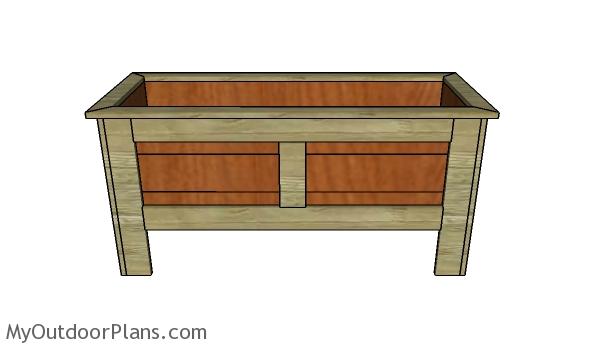
Planter Box with Legs Plans
Last but not least, you need to take care of the finishing touches. Therefore, you have to drill drainage holes through the bottom of the planter box. In addition, you should consider stapling landscape fabric to the interior walls of the planter box, so you protect the components from decay.
Fill the holes and the dents with wood putty and let it harden for a few hours. Smooth the surface with 120-220 grit sandpaper and apply a few coats of stain or paint to enhance the look of the wood. Seal the finish with a few coats of spar varnish.
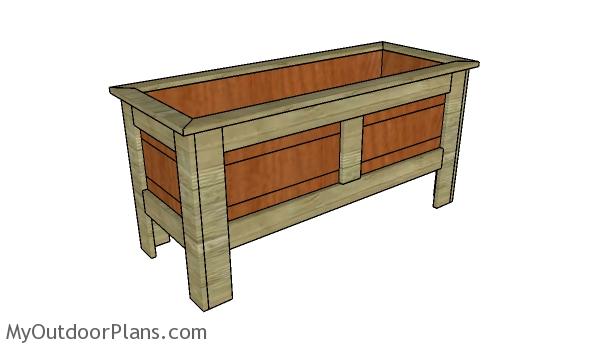
Wood Planter Box Plans
This planter box has a modern design and it is super easy to build, making it the perfect beginner friendly project. If you love flowers, you should consider building this planter for your deck or patio. If you build this, I would love to see your project.
This woodworking project was about wood planter box plans free. If you want to see more outdoor plans, check out the rest of our step by step projects and follow the instructions to obtain a professional result.

2 comments
Sir/Ma’am,
This is my first wood working project and I am not know for my handyman abilities. Do you have more detailed step by step instructions for this planter box? Thank you very much for your time and help.
Very Respectfully,
Brad
I have no plans that are more detailed than this. You have here the materials list, the cut list and step by step instructions with diagrams. I’m sure you can get the job done!